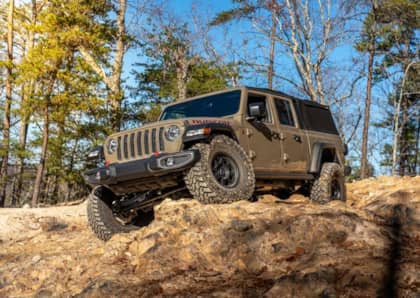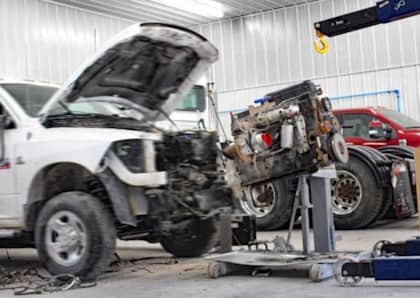3 Fast Foxes That Aren't Ford Mustangs
Ford's Fox platform is best known for underpinning the 5.0 Mustang that dominated street drags and starred in Vanilla Ice chart toppers for the better part of a decade. What some performance fans aren't aware of, however, is that the Fox was versatile enough to serve as the starting point for a long list of sedans, coupes and even a trucklet dating all the way back to the end of the 1970s. The Mustang might still dominate the conversation today, but there's a thriving community of owners, builders and shops still working hard to squeeze as much speed as possible out of these alterna-Foxes.
Which are the fastest Foxes to wear the Ford, Lincoln and Mercury badges, outside the Mustang universe? We've rounded them up for you below.
1. 1984-1992 Lincoln Mark VII

From the moment it appeared for the 1984 model year, it was clear that the Lincoln Mark VII was walking a different path as compared to the Mark series luxury coupes that had come before it. While it still offered the ultimate in personal luxury from a brand that had yet to lose its luster among American buyers, it backed away from the yacht-sized, float-down-the-road feel of the Mark VI in favor of a more driver-oriented offering.
Thanks in large part to the Fox platform, the Lincoln Mark VII was smaller, lighter and quicker than its predecessor by a considerable margin. It featured a full air suspension system, came standard with a 5.0L V8 and by 1985 it was the first vehicle in the United States to feature four-channel anti-lock brakes.
In terms of power, later cars (1987-1992) matched the Mustang's 225hp, 300 lb-ft of torque H.O. V8, paired with a four-speed automatic transmission. Earlier cars came with 140, 150, and 200hp versions of the 5.0L V8 (which can still serve as a decent starting point for hot rodders intent on squeezing out a bit more grunt). With the right pedal foot floored, the car would do 0-60-mph in 8.3 seconds, which was a respectable time in an era where acceleration was often measured in double digits on the clock.
2. 1979-1986 Mercury Capri

When is a Mustang not a Mustang? When it's a Mercury, of course. Although the Capri badge has been found on a number of wildly different automobiles dating all the way back to 1970, the Fox edition mirrors the Mustang's 1979-1986 generation, with a few key differences.
Mechanically the car is identical to its pony-wearing sibling, but in terms of style the Capri can be identified by its unique front and rear bumpers, grille and hatch, with the latter featuring unusual, bulging glass as compared to the more straightforward Mustang cargo lift-up. There's also no notchback of the Capri to have ever officially been built, making it hatch-only throughout its entire run, with the exception of a handful of convertible conversions built by ASC.
The most sought-after version of the Capri is the one featuring the Mustang's 5.0 H.O. V8, but you can also squeeze decent power from the 2.3L turbocharged four-cylinder found in the RS version of the car—if you can find one, that is. Consider its 130hp as a mere starting point, with 300hp well within reach after a few judicious modifications. Less than 10 percent of the Capris's production, 9,500 cars in total, were RS Turbos.
3. 1983-1988 Ford Thunderbird/Mercury Cougar

Would it surprise you to learn that for a time both Ford and Mercury based their full-size coupes on the same Fox platform associated with the Mustang? Given the vagaries of '80s bean counters, this is probably less shocking than it would be in a more modern context (and by the end of the decade the Ford Thunderbird and the Mercury Cougar moved on to the MN chassis), but for a brief shining moment the Blue Oval was doing everything it could to maximize its Fox investment.
The two most interesting versions of both the Thunderbird and the Cougar feature, you guessed it, a high-output 5.0L V8 and a turbocharged 2.3L four-cylinder engine. Ford made the 5.0L the T-Bird's top-tier motor throughout its entire run, with the Turbo Coupe snagging the four, but Mercury approached things somewhat differently: the 155hp 2.3L turbo was only available (under the XR-7 banner) from '84 to '86.
The Mercury was also somewhat hobbled as compared to the Ford in terms of output. For 1987 and 1988, the Thunderbird Turbo Coupe stepped up from 155hp to 190hp thanks to the inclusion of the intercooler from the Mustang SVO (giving a top speed of over 140 mph). You had to order the five-speed manual gearbox to benefit, however, as Ford kept the four-speed autobox cars at 150hp to protect their more delicate internals. The Cougar never saw this upgrade—although it's possible to add it to earlier turbo cars via the aftermarket—and for much of the decade its V8 and turbo offerings featured nearly the same rating.







